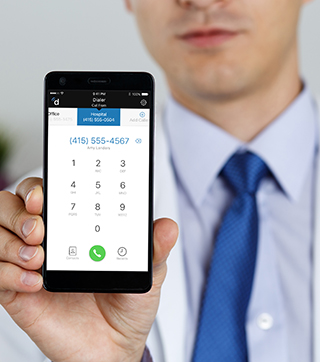 San Francisco-based Doximity announced today a collaboration to enable one-touch dialing of patients from directly within Haiku, Epic’s mobile platform for electronic health records.
San Francisco-based Doximity announced today a collaboration to enable one-touch dialing of patients from directly within Haiku, Epic’s mobile platform for electronic health records.
The new integration will allow doctors to easily make calls while they are viewing a patient’s medical records, and will not display the caller’s personal cell phone number. Instead, patients’ caller IDs will display an office, clinic, or hospital phone number.
“The big challenge they had is that when [doctors] are calling patients, they want to do so from their office phone number, their hospital phone number, the number that they want the patient to both recognize and have to call back to them,” Joel Davis, vice president of strategic analytics and growth at Doximity, told MobiHealthNews. “This funny little quirk was actually creating a lot of bizarre behavior on the part of doctors where they might be away form the office toward the end of the day, and then have to go back to the office to place calls.”
The one-touch dialing functionality will be available with the latest download of Epic’s Haiku.
Davis said that Epic reached out to Doximity after receiving comments from doctors using Haiku. Doximity had already rolled out the one-touch dialing service, called Doximity Dialer, for their own user base of more than 900,000 physicians and advanced practice clinicians. In a survey of their early users, doctors reported saving 20 minutes per day, calling six or more patients weekly, and receiving calls from five or more patients weekly. The full launch of Doximity Dialer was extremely successful, Davis said, and the company has recorded nearly 500,000 patient calls within the past month.
“All of those additional connections, of course, translate to better informed patients, on their plan and their care, and better outcomes,” he added.
Dr. Marlene Millen, chief medical information officer, ambulatory care, at University of California San Diego Health, said that she download Doximity Dialer immediately upon hearing about it.
“There’s been days where I’m sitting here waiting to get the phone to even ring because I want to block the number for my own personal safety,” she told MobiHealthNews. “Even the patients I trusted and called directly, they’ve saved my number and called me back directly or text me, which of course is not always HIPAA compliant.”
Millen said that the one-touch dialing has been well received by colleagues across specialties, and was especially useful for a clinic that had been having issues with a “problematic” patient population. Collaborations such as these are far-reaching, she said, and should be encouraged due to their positive impacts on care.
“The days of isolating are over, and it’s really important that relationships like Doximity and Epic get highlighted,” she said. “I think these are the opportunities going forward to really tackle some other big issues like physician burnout, and healthcare is a changing environment.”














